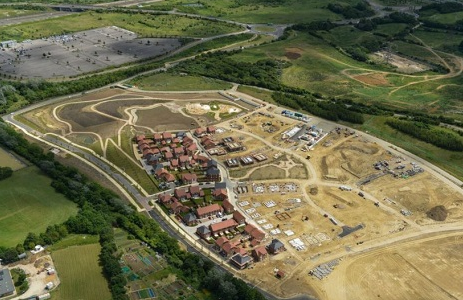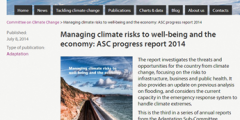Using System Dynamics for Sustainable Water Management in Ebbsfleet: Part 1
March 5, 2018
In this blog, the first in a series on the use of system dynamics for developing a sustainable urban water management strategy in Ebbsfleet, colleagues from across the Urban Flood Resilience consortium outline plans for using this novel participatory technique, and report on the outcomes of the first modelling workshop. Introduction and case study site …
Urban Flooding and Sponge Cities Workshop, 3-5 July 2017, China
July 26, 2017
In his blog, Sangaralingam Ahilan reports on the UK-China joint workshop on ‘Urban Flooding and Sponge Cities’ at the 2017 annual conference of the International Institute for Infrastructure Resilience and Reconstruction (IIIRR) held on 3-5th July 2017 at Shenzhen, China. The workshop was co-ordinated by University of Exeter, UK and Tsinghua University, China and funded …
SCOT Flood Forum – 23rd February 2017
March 1, 2017
The Urban Flood Resilience team were invited to showcase their project aims, objectives and case studies at the February meeting of the SCOT Flood Forum. This was a great opportunity for the ‘Achieving Urban Flood Resilience in an Uncertain Future’ (UFRM) research project to introduce its wide reaching research team (including social scientists from the Open …
Translating Blue-Green theory into practice: winning hearts and minds
June 27, 2016
Guest post by Laura McGinty, Newcastle University. If you’ve stumbled across this blog then the chances are that you know at least a little bit about Blue-Green Infrastructure, and the role of ecosystem services in climate change adaptation and mitigation. You’re probably not the average “Joe Public”, but rather someone with some kind of specialist …
How can woodland help reduce flooding?
June 8, 2015
The potential of woodland to prevent flooding has been enthusiastically promoted in recent years, particularly by environmental interest groups such as the Woodland Trust and the WWF (see Woodland Trust, 2012, p13-15 and WWF Scotland, 2007, p2). However, some commentators have questioned the robustness of the link between woodland cover and flooding (see Calder & Aylward, …
Geographies of UK flooding in 2013/4
January 8, 2015
A new paper published by Prof Colin Thorne (University of Nottingham) in The Geographical Journal looks at explaining the UK flooding in winter 2013-14 and implications for sustainable management of future flood risks. The paper focuses on the geography of flooding, and in particular, the physical geography (urban and rural), social geography, and political geography. Colin concludes …
Piloting Bayesian Networks as a technique for the participatory modelling of flood risk in Hebden Bridge, West Yorkshire: Part II
November 19, 2014
Part II: Using the model – the final three workshops A project has been underway in Hebden Bridge, West Yorkshire to develop and pilot a methodology to involve stakeholders in modelling flood risk to their local catchment, and embed their local knowledge and understanding into flood risk management. The project, which is now coming to …
Managing climate risks to well-being and the economy: ASC progress report, 9th July 2014
August 4, 2014
Blog post by Emily Lawson, University of Nottingham. On Wednesday 9th July I attended the Adaptation Sub Committee (ASC) annual report launch at the satellite event in Nottingham, organised by Climate UK and Climate East Midlands. The report, titled “Managing climate risks to well-being and the economy”, was summarised in a presentation from Lord John Krebs, …
Faith Chan (UNNC) meets with Blue-Green Cities in Portland, May 2014
May 7, 2014
Blog post by Faith Chan, Lecturer of Environmental Sciences at the University of Nottingham Ningbo China (UNNC) campus. Rapid socio-economic growth and human-induced developmental effects in China is making an eye-catching global success story with tremendous business and employment opportunities attracting huge settlements on China’s coastal port cities. However, the projected effects of climate change may …
A Blue-Green Approach to Flood Risk Management in Asia’s Mega-deltas?
February 19, 2014
Can we adapt the Blue-Green approach for flood risk management and make it a suitable alternative to traditional hard engineering for addressing some of the flooding issues in Asia’s urban mega-deltas? After hearing about the severe flooding that affected Ningbo (and surrounding areas in Zhejiang), China, in mid-October 2013, I have been reading up on some …










